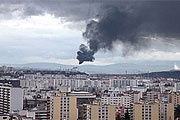
More than one million could be saved each year if cities around the world adhered to United Nations guidelines on air pollution from cars and factories that can cause heart disease, lung cancer, asthma, and acute lower respiratory infections, according to a new UN report. “Across the world, city air is often thick with exhaust fumes, factory smoke or soot from coal burning power plants, UN World Health Organization (WHO) Director for Public Health and Environment Maria Neira said of her agency’s “unprecedented” compilation of data from nearly 1,100 cities across 91 countries. “In many countries there are no air quality regulations and, where they do exist, national standards and their enforcement vary markedly,” she added, calling for greater awareness of health risks caused by urban air pollution, implementation of effective policies and close monitoring of the situation. (From WHO & UN News Centre Sources)
Rising Mortality from Urban Air Pollution:
WHO estimates that more than two million people die annually from breathing in tiny particles present in indoor and outdoor air pollution. PM10 particles, which are 10 micrometers or less, can penetrate the lungs and may enter the bloodstream, causing the diseases. WHO guidelines for PM10 is 20 microgrammes per cubic metre as an annual average, but the data show that in some cities this has reached up to 300 microgrammes. Only a few cities currently meet the guidelines. For 2008, the estimated mortality attributable to outdoor air pollution in cities amounted to 1.34 million premature deaths, increasing from 1.15 million in 2004. If the WHO guidelines had been universally met, an estimated 1.09 million of those 2008 deaths could have been prevented, the agency said. The increase in the mortality is linked to recent increases in pollution and in urban population size, as well as improved data availability and methods employed.
The Culprits:
“The most powerful way that the information from the WHO database can be used is for a city to monitor its own trends in air pollution over time, so as to identify, improve and scale-up effective interventions,” said Carlos Dora, WHO’s Coordinator for Interventions for Health Environments. In both developed and developing countries, the largest contributors to urban outdoor air pollution include motor transport, small-scale manufacturers and other industries, burning of biomass and coal for cooking and heating, as well as coal-fired power plants. Residential wood and coal burning for space heating is an important contributor to air pollution.
“Local actions, national policies and international agreements are all needed to curb pollution and reduce its widespread health effects,” said Michal Krzyzanowski, Head of the WHO European Centre for Environment and Health. “Data from air quality monitoring that is released today, identify regions where action is most needed and allows us to assess the effectiveness of implemented policies and actions.”
FILM REPORT –“World’s Biggest Killers”-
diplomaticallyincorrect.org/films/movie/worlds-biggest-killers/26502
By Ambassador Muhamed Sacirbey
Facebook-Become a Fan at “Diplomatically Incorrect”
Twitter – Follow us at DiplomaticallyX

